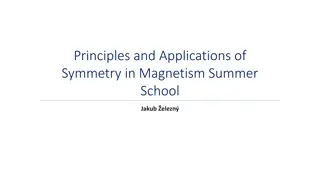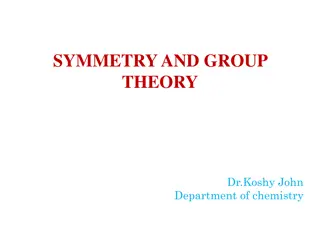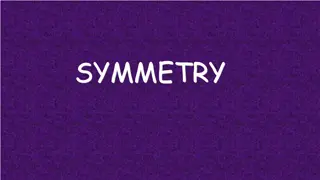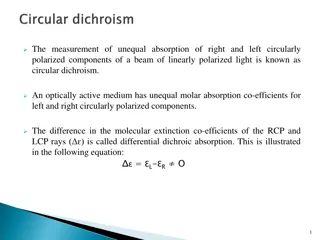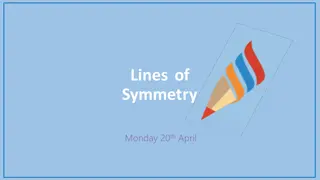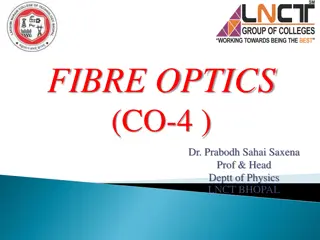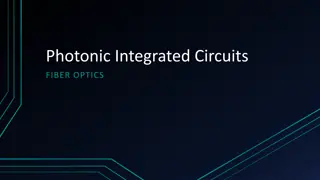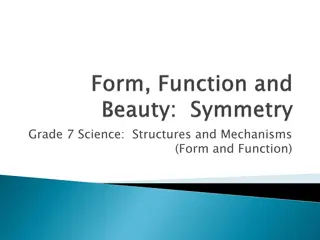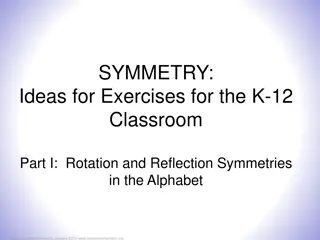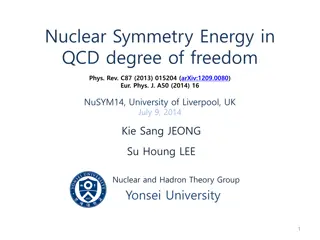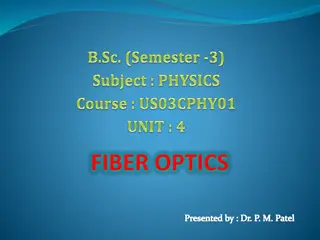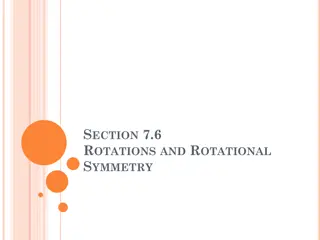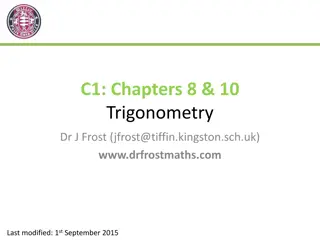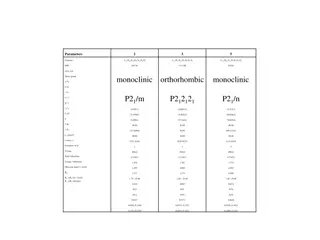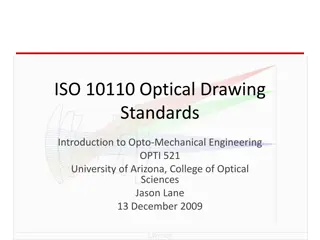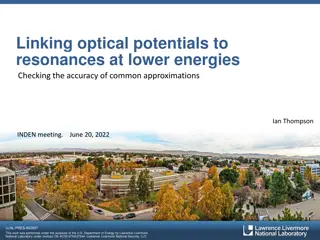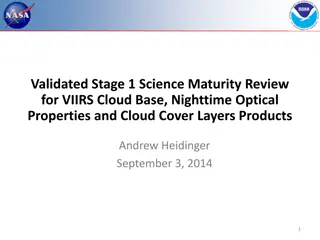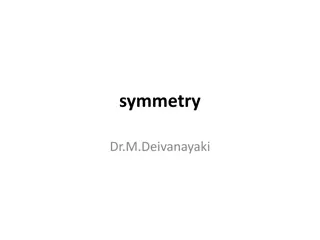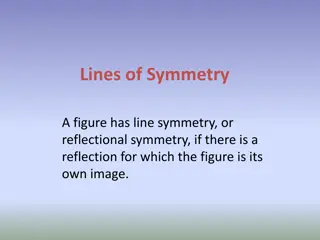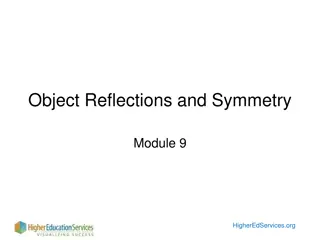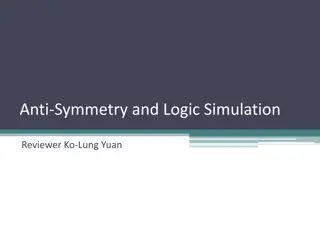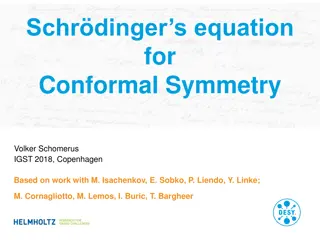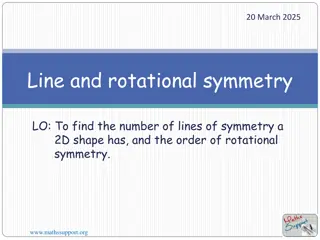Insights into Symmetry and Magnetism in Summer School Curriculum
Delve into the principles and applications of symmetry in magnetism through topics like tensor transformations, Edelstein effect, and breaking inversion symmetry in magnetic materials. Explore the role of crystal structures and interfaces in breaking symmetry, especially in antiferromagnets, providi
3 views • 39 slides
Principles and Applications of Symmetry in Magnetism Summer School Lecture
This lecture delves into the principles and applications of symmetry in magnetism, covering topics such as the symmetry of response tensors, transformations of tensors, time-reversal symmetry, and beyond point groups. It explores the symmetry of local effects, equivalent magnetic configurations, exp
3 views • 14 slides
Symmetry and Group Theory in Chemistry
Exploring the world of symmetry elements in molecules, encompassing identity, proper axis of symmetry, centre of symmetry, and plane of symmetry. Learn how these elements help in identifying the symmetry of molecules quantitatively, with examples like N2F2, H2O, C2H4, NH3, and Dichlorobenzene.
2 views • 12 slides
Symmetry in Shapes: A Visual Exploration
Delve into the world of symmetry with explanations and visual examples of line symmetry in shapes like squares, kites, and parallelograms. Explore the concept of rotational symmetry and try your hand at completing shapes based on given lines of symmetry. Discover the special properties of the letter
3 views • 23 slides
Optical Properties of Optically Active Compounds
Circular dichroism and optical rotatory dispersion are important techniques for studying the optical properties of optically active compounds. Circular dichroism measures the differential absorption of left and right circularly polarized light components, while optical rotatory dispersion studies th
1 views • 17 slides
Geometry Learning - Lines of Symmetry Activities
Explore various activities focused on lines of symmetry in shapes. Engage in identifying symmetrical shapes, finding lines of symmetry through folding, sorting shapes based on symmetrical properties, drawing lines of symmetry, and reasoning about symmetrical shapes. Enhance your understanding of sym
2 views • 16 slides
Overview of Optical Fibre Technology and Applications
Optical fibre technology, spearheaded by Dr. Prabodh Sahai Saxena, revolutionizes communication systems through light transmission. This cutting-edge technology utilizes fibre optics made of glass or plastic to carry light signals, offering advantages like high bandwidth, low signal loss, and no ele
1 views • 20 slides
Evolution of Optical Technology: From Telegraph to Photonic Integrated Circuits
The journey of optical technology evolution spans from the invention of the telegraph in 1836, through the introduction of optical fibers in 1978, to the development of photonic integrated circuits in the present era. Key milestones include the advent of optical amplifiers in 1990, the emergence of
0 views • 70 slides
Symmetry in Structures and Aesthetics
Exploring the concept of symmetry and its impact on form, function, and aesthetics in structures. Symmetry plays a crucial role in identifying and appreciating the beauty of objects, with examples ranging from nature to architectural marvels like the Taj Mahal and Hundertwasser's unconventional desi
1 views • 15 slides
Symmetry in the Alphabet: Rotation and Reflection Symmetries
Discover how rotation and reflection symmetries play a role in the alphabet, with most letters exhibiting some type of symmetry. Explore rotational symmetries both in and perpendicular to the plane, as well as symmetries across horizontal and vertical axes. Learn about the concepts of rotational sym
1 views • 13 slides
Optical Alignment Using Beam Triangle Opti 521 Phil Scott
This presentation delves into the intricate process of optical alignment using a beam triangle, focusing on defining optical and mechanical axes, addressing alignment challenges, degrees of freedom for various elements, and the importance of setting up a beam triangle for accurate alignment. The con
0 views • 14 slides
Transimpedance Amplifiers in CMOS Technology for Optical Communications at 40 Gb/s
This research by Joseph Chong at Virginia Tech delves into the use of transimpedance amplifiers (TIAs) in CMOS technology for optical communications operating at a data rate of 40 Gb/s. The study outlines the motivation behind the project, the role of TIAs in optical receivers, TIA circuit topologie
0 views • 52 slides
Fascination with Symmetry in Art and Nature
Delve into the captivating world of symmetry and its appeal to humans. Symmetry, whether reflectional or rotational, resonates with our aesthetic sense by showcasing balance, repetition, and identical patterns. Through images and definitions, uncover the beauty and significance of symmetry in variou
1 views • 27 slides
Optical Frequency Interferometer Bench Analysis
Detailed examination of the optical setup for an Optical Frequency Interferometer (OFI) system, including the input/output configurations with various optical components such as prisms, crystals, and wave plates. The analysis focuses on the path and behavior of beams within the system, considering r
1 views • 14 slides
Nuclear Symmetry Energy in QCD Degree of Freedom
Understanding the nuclear symmetry energy in the context of Quantum Chromodynamics (QCD) is essential for nuclear phenomenology. This study explores topics such as QCD sum rules, mean field approximation, and operator product expansion to decipher the energy properties of nuclear systems. The resear
1 views • 15 slides
Crystal Geometry Systems and Symmetry Elements
Crystal geometry involves the study of seven crystal systems defined by three symmetry elements - centre of symmetry, planes of symmetry, and axes of symmetry. These symmetry elements play crucial roles in determining the geometric properties of crystals. The centre of symmetry, plane of symmetry, a
1 views • 12 slides
Evolution of Optical Fiber Technology
Optical fiber technology has a rich history starting from John Tyndall's demonstrations in 1870 to the development of flexible fiberscopes by Hopkins and Kapany. This technology revolutionized communication systems and medical diagnostics, enabling the transmission of information through thin glass
2 views • 85 slides
Optical Image Formation: Principles and Conditions
Understanding the principles and conditions governing optical image formation, including the role of broad bundles of rays, wave surfaces, magnification ratios, and axially-symmetric optical systems. Explore the conditions for imaging line segments, optical path lengths, and the general criteria for
1 views • 13 slides
Rotations and Rotational Symmetry in Geometry
Delve into the concepts of rotations, rotational symmetry, and the Windmill Method in geometry. Learn about different types of rotations, how to rotate points around the origin, practice rotations with given points, and understand rotational symmetry in objects. Discover the principles of rotating o
1 views • 9 slides
Trigonometry Concepts: Graphs, Symmetry, and Laws Explained
Explore trigonometry concepts such as sine, cosine, and tangent graphs, symmetry in trigonometric functions, and laws of trigonometric functions. Understand how to determine values using symmetry and graph analysis. Practice identifying values in the range 0 to 360 for sine, cosine, and tangent func
1 views • 22 slides
Exploring Topological Band Theory and Quantum Phases in Electronic Matter
Delve into the fascinating realm of topological band theory, examining the insulating state, band topology in different dimensions, symmetry-protected topological band insulators, and the interplay between symmetry and topology. Uncover the principles underlying matter symmetry, quantum phases, and
1 views • 29 slides
Impact of Symmetry and Eye Color on Perceived Attractiveness in Female College Students
This research explores the effects of facial symmetry and eye color on perceived attractiveness and mate quality in female college students. The study investigates whether symmetrical faces and certain eye colors enhance attractiveness and mate selection. Factors such as bilateral symmetry, fluctuat
0 views • 13 slides
Lab 3: Centering Optical Elements & Systems with Precision
Centering optical elements and systems accurately is crucial for optical alignment processes. This lab focuses on using an air bearing rotary table and dial indicators to achieve precise centering. The equipment used includes PSM, displacement indicators, adjustment screws, and magnetic mounts. Prop
1 views • 14 slides
Conservation Laws: Charge Conjugation, Parity Symmetry, and Violation
In this comprehensive guide, we delve into the intricate concepts of charge conjugation symmetry, G-parity, and the conservation and violation of parity symmetry in fundamental physics. Explore how these principles apply to strong, electromagnetic, and weak interactions through detailed explanations
0 views • 14 slides
Structural Parameters and Symmetry Operations of Organic Compounds
This document presents detailed structural parameters of various organic compounds along with their space groups, crystal systems, and symmetry operations including rotary inversion, screw axis, and glide plane. The data includes molecular formulas, molecular weights, unit cell dimensions, and refle
0 views • 7 slides
ISO 10110 Optical Drawing Standards
ISO 10110 Optical Drawing Standards provide guidelines for preparing drawings of optical elements and systems, essential for interpreting optical drawings accurately. The standard includes 13 parts covering aspects such as material imperfections, surface form tolerances, and more. Compliance with IS
0 views • 17 slides
Optical Potentials and Resonances at Lower Energies
Investigating the accuracy of common approximations in linking optical potentials to resonances at lower energies. The study focuses on neutron reactions with 14N as a test case, transitioning from R-matrix theory to Hauser-Feshbach models and evaluating known levels and level densities. Key topics
0 views • 22 slides
VIIRS Cloud Base & Optical Properties Review
In this review, Andrew Heidinger evaluates the maturity of VIIRS Cloud Base, Nighttime Optical Properties, and Cloud Cover Layers products. The assessment includes requirements, algorithm performance, error budget, and issues hindering Stage 1 maturity. The analysis covers Cloud Base Height, Nightti
0 views • 18 slides
symmetry
Biological symmetry plays a fundamental role in the morphology and functionality of organisms. Explore different types of symmetry such as radial, bilateral, and biradial, as well as the significance of asymmetry. Discover how symmetry or its absence influences the spatial arrangement and functional
0 views • 7 slides
Lines of Symmetry
A comprehensive guide to lines of symmetry and rotational symmetry in figures, including examples and explanations for regular polygons. Discover how to determine the number of lines of symmetry and the angle of rotation for different shapes.
0 views • 8 slides
Symmetry and Satisfiability Update: An Insightful Study
This updated work by Hadi Katebi, Karem A. Sakallah, and Igor L. Markov delves into the interplay between symmetry and satisfiability, offering a fresh perspective on the subject. The presentation by Chien-Yen Kuo sheds light on new findings and potential implications in the field. This insightful e
0 views • 18 slides
Object Reflections and Symmetry
Delve into the intriguing world of object reflections and symmetry in this educational module. Explore topics such as reflections of objects, planes of symmetry, and reflections through rotations. Discover how multiple planes of symmetry can exist in various objects and learn to work with reflection
0 views • 8 slides
Anti-Symmetry and Logic Simulation
This review discusses anti-symmetry and logic simulation by Ko-Lung Yuan, covering topics such as classical symmetry, symmetry detection, experimental results, and conclusions.
1 views • 45 slides
Schrödinger's Equation for Conformal Symmetry
Volker Schomerus presented on Schrödinger's equation for conformal symmetry at IGST 2018 in Copenhagen. The talk was based on collaborative work with M. Isachenkov, E. Sobko, P. Liendo, Y. Linke, M. Cornagliotto, and M. and explored the implications of conformal symmetry in quantum mechanics.
0 views • 20 slides
Optical Circuit Switching Technologies for Data Centers
Explore the feasibility of implementing completely wireless data centers using optical circuit switches, comparing them with traditional electrical packet switching technologies. Learn about hybrid packet/circuit switched networks and the advantages of optical circuit switching in terms of switching
0 views • 24 slides
Understanding Optical Fiber Communication Systems
Explore the world of optical fiber communication systems, from the basics of communication to the intricate workings of optical fibers. Learn how information is exchanged, the components of optical fibers, and the functions of optical communication systems. Discover how light signals travel through
0 views • 17 slides
Understanding Optical Fiber Waveguides: Ray Theory Transmission and Refraction
Learn about the ray theory model for light propagation in optical fiber waveguides, including the role of refractive indices, refraction at interfaces, critical angles, total internal reflection, meridional rays, acceptance angles, and numerical aperture. Explore how light behaves within optical fib
0 views • 16 slides
Understanding Symmetry and Transformation Principles Across Art, Science, and Mathematics
Discover the historical significance, mathematical concepts, and applications of symmetry and transformation in various fields like art, science, and mathematics. Explore the types of symmetry, its importance in geometry, and how symmetry groups help analyze symmetrical properties. Enhance your know
0 views • 22 slides
Understanding Molecular Symmetry in Physical Chemistry III
Discover the significance of molecular symmetry in Physical Chemistry III, exploring topics like group theory, point groups, symmetry operations, and symmetry elements. Dive into the classification of molecules based on their symmetry properties and their relevance in spectroscopic transitions.
0 views • 35 slides
Understanding Lines and Rotational Symmetry in 2D Shapes
Learn about lines and rotational symmetry in 2D shapes. Discover how many lines of symmetry different shapes have and the order of rotational symmetry they exhibit. Explore the concepts through explanatory images and explanations on mathssupport.org.
0 views • 28 slides
